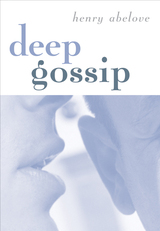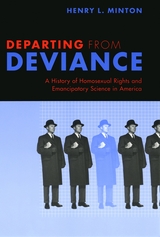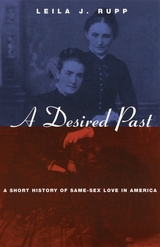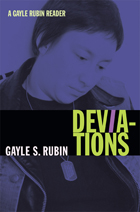164 books about Homosexuality and 5
start with D
164 books about Homosexuality and 5
164 books about Homosexuality
5 start with D start with D
5 start with D start with D

Danger Zones
Homosexuality, National Identity, and Mexican Culture
Claudia Schaefer
University of Arizona Press, 1996
Homosexuality has appeared as a secondary theme in the fictional works of numerous mainstream writers in contemporary Mexico. Here, the author deals with issues of gender identity when they emerge as metaphorical red flags signaling cultural danger zones along the path to harmonious national discourse. By focusing on the representation of homosexuality in a variety of texts produced between 1964 and 1994, the book also delineates complex relationships within Mexican society.
Contents:
1. El diario de José Toledo: The Fantasies of a Middle-Class Bureaucrat
2. The Power of Subversive Imagination: Utopian Discourse in the Novels of Luis Zapata and José Rafael Calva
3. On the Cutting Edge: El jinete azul and the Aesthetics of the Abyss
4. Monobodies, Antibodies, and the Body Politic: Sara Levi Calderón’s Dos mujeres
5. Just Another Material Girl? La hermana secreta de Angélica María and the Seduction of the Popular
6. From "Infernal Realms of Delinquency" to Cozy Cabañas in Cuernavaca: José Joaquín Blanco’s Visions of Homosexuality
Contents:
1. El diario de José Toledo: The Fantasies of a Middle-Class Bureaucrat
2. The Power of Subversive Imagination: Utopian Discourse in the Novels of Luis Zapata and José Rafael Calva
3. On the Cutting Edge: El jinete azul and the Aesthetics of the Abyss
4. Monobodies, Antibodies, and the Body Politic: Sara Levi Calderón’s Dos mujeres
5. Just Another Material Girl? La hermana secreta de Angélica María and the Seduction of the Popular
6. From "Infernal Realms of Delinquency" to Cozy Cabañas in Cuernavaca: José Joaquín Blanco’s Visions of Homosexuality
[more]

Deep Gossip
Henry Abelove
University of Minnesota Press, 2005
Henry Abelove, literary critic, astute historian, and pioneer in queer studies, offers interdisciplinary views on the connections between politics, culture, and sexuality. Deep Gossip addresses the willful misreading of Freud's views on homosexuality among American psychoanalysts; reconsiders sexual practice during England's eighteenth century; assesses the contemporary relevance of Thoreau's Walden, particularly to queer politics; and traces the emergence of a queer critique of previous approaches to lesbian and gay history. Abelove uncovers the origins of American studies as a scholarly discipline and evaluates the impact of literature - specifically the same-sex eroticism found in works by such writers as James Baldwin, Elizabeth Bishop, Paul Bowles, and Ned Rorem - on the gay liberation movement of the 1970s. The essays gathered in Deep Gossip confirm Henry Abelove's reputation as one of America's leading thinkers on the cultural politics of sexuality.
[more]

Departing from Deviance
A History of Homosexual Rights and Emancipatory Science in America
Henry L. Minton
University of Chicago Press, 2001
The struggle to remove the stigma of sickness surrounding same-sex love has a long history. In 1973, the American Psychiatric Association removed homosexuality from its diagnostic classification of mental illness, but the groundwork for this pivotal decision was laid decades earlier. In this new study, Henry L. Minton looks back at the struggle of the American gay and lesbian activists who chose scientific research as a path for advancing homosexual rights. He traces the history of gay and lesbian emancipatory research from its early beginnings in the late nineteenth century to its role in challenging the illness model in the 1970s. By examining archival sources and unpublished manuscripts, Minton reveals the substantial accomplishments made by key researchers and relates their life stories. He also considers the contributions of mainstream sexologists such as Alfred C. Kinsey and Evelyn Hooker, who supported the cause of homosexual rights through the advancement of scientific knowledge. By uncovering this hidden chapter in the story of gay liberation, Departing from Deviance makes an important contribution to both the history of science and the history of sexuality.
[more]

A Desired Past
A Short History of Same-Sex Love in America
Leila J. Rupp
University of Chicago Press, 1999
With this book, Leila J. Rupp accomplishes what few scholars have even attempted: she combines a vast array of scholarship on supposedly discrete episodes in American history into an entertaining and entirely readable story of same-sex desire across the country and the centuries.
"Most extraordinary about Leila J. Rupp's indeed short, two-hundred-page history of 'same-sex love and sexuality' is not that it manages to account for such a variety of individuals, races, and classes or take in such a broad chronological and thematic range, but rather that it does all this with such verve, lucidity, and analytical rigor. . . . [A]n elegant, inspiring survey." —John Howard, Journal of American History
"Most extraordinary about Leila J. Rupp's indeed short, two-hundred-page history of 'same-sex love and sexuality' is not that it manages to account for such a variety of individuals, races, and classes or take in such a broad chronological and thematic range, but rather that it does all this with such verve, lucidity, and analytical rigor. . . . [A]n elegant, inspiring survey." —John Howard, Journal of American History
[more]

Deviations
A Gayle Rubin Reader
Gayle S. Rubin
Duke University Press, 2012
Deviations is the definitive collection of writing by Gayle S. Rubin, a pioneering theorist and activist in feminist, lesbian and gay, queer, and sexuality studies since the 1970s. Rubin first rose to prominence in 1975 with the publication of “The Traffic in Women,” an essay that had a galvanizing effect on feminist thinking and theory. In another landmark piece, “Thinking Sex,” she examined how certain sexual behaviors are constructed as moral or natural, and others as unnatural. That essay became one of queer theory’s foundational texts. Along with such canonical work, Deviations features less well-known but equally insightful writing on subjects such as lesbian history, the feminist sex wars, the politics of sadomasochism, crusades against prostitution and pornography, and the historical development of sexual knowledge. In the introduction, Rubin traces her intellectual trajectory and discusses the development and reception of some of her most influential essays. Like the book it opens, the introduction highlights the major lines of inquiry pursued for nearly forty years by a singularly important theorist of sex, gender, and culture.
[more]
READERS
Browse our collection.
PUBLISHERS
See BiblioVault's publisher services.
STUDENT SERVICES
Files for college accessibility offices.
UChicago Accessibility Resources
home | accessibility | search | about | contact us
BiblioVault ® 2001 - 2024
The University of Chicago Press









